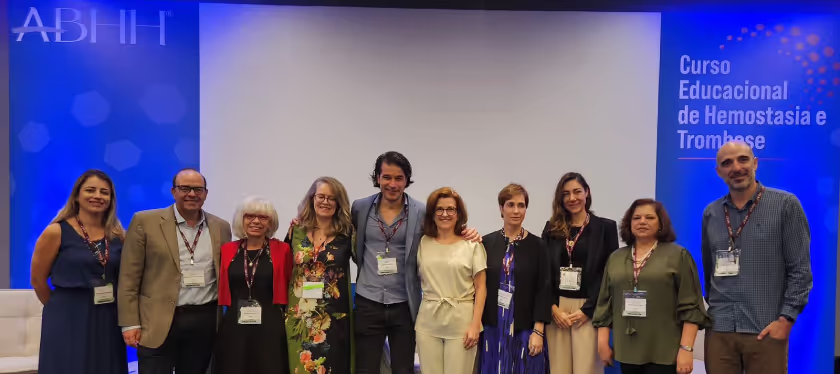This Saturday (18th), the Hemostasis and Thrombosis Educational Course continued with its programming, on the second day of presentations. At the opening table, focused on laboratory discussions, Dr. Daniel Ribeiro and Dr. Danyelle Romana spoke about the clinical and laboratory interpretation of coagulation tests and the thrombin generation test.
Speaking at the table, Dr. João Guerra discussed the importance of technology in laboratory analysis. “The doctor needs the support of laboratories and analyses for appropriate conduct,” he emphasized. In his presentation, Dr. Daniel Ribeiro emphasized that the interpretation of laboratory tests is sensitive. “You have to think about the exam you're going to do,” he said of the analysis of the patient's condition.
Regarding the thrombin generation test, Dr. Danyelle Romana commented that conventional tests do not present all the risk factors for evaluating the hemostatic process. Then, Dr. Dayse Lourenço brokered a panel about thromboses in unusual places and, at the opening, warned: “We need to understand the specific characteristics and implications of each case,” she said.
Dr. Daniel Dias returned to the stage to talk about abdominal thrombosis. “There are important differences between abdominal events, and it's important to know the origin,” he said. In the same session, Dr. Suely Rezende addressed thrombosis in the central nervous system and brain. “We, as hematologists, ended up receiving these patients after the event occurred, but it's important to know that a headache with a change in characteristic is indicative,” she explained.
Dr. Dayse concluded the session with information on direct oral anticoagulants and their application to other uncommon thromboses, presenting specific regimens of conduct. “Observing behavioral data and side effects for each condition and location of thrombosis is decisive for successful treatment,” he emphasized.
The course closed its program with a presentation session of four cases suggested by the participants.
Presentations of the Hemostasis and Thrombosis Educational Course, held in Belo Horizonte, on May 17 and 18, will soon be available at the Hemoteca.









